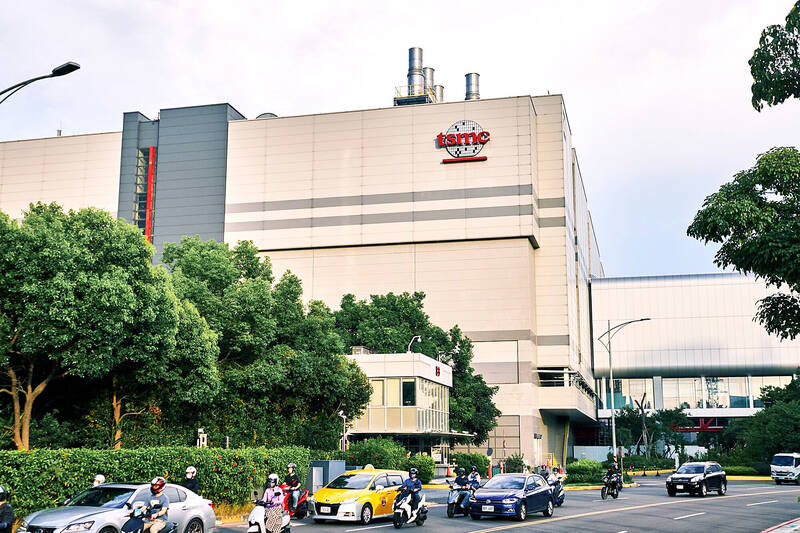Taiwan Semiconductor Manufacturing Co (TSMC, 台積電) yesterday obtained the government’s approval to inject an additional US$7.5 billion into its US subsidiary, the Department of Investment Review said in a statement.
The department approved TSMC’s application of investing in TSMC Arizona Corp, which is engaged in the manufacturing, sales, testing and design of IC and other semiconductor devices, it said.
The latest capital injection follows a US$5 billion investment for TSMC Arizona approved in June. The chipmaker has broken ground on two advanced fabs in Arizona with aggregated investments approved by the department totaling US$24 billion thus far.

Photo: An Rong Xu, Bloomberg
According to TSMC, the first Arizona fab is scheduled to start mass production using sophisticated 4-nanometer process technology in the first half of next year, while the second fab is to begin volume production using 3nm and 2nm process technology in 2028.
TSMC has also unveiled plans to build a third fab there using the 2nm process or more advanced technology with overall investments above US$65 billion in Arizona.
The chipmaker also in February launched a fab in Kumamoto, Japan and announced plans for a second, as part of an estimated US$20 billion investment. In Europe, it broke ground on a 12-inch wafer fab in Dresden, Germany, last month.
However, TSMC said earlier yesterday that it has no new concrete overseas expansion plans, following news reports that its top executives recently held talks in the United Arab Emirates (UAE).
While not addressing the UAE rumors directly, TSMC told CNA that it was always open to constructive discussions on promoting the development of the semiconductor industry, adding it remained focused on its current global projects.
On Sunday, the Wall Street Journal reported that top TSMC executives recently visited the UAE to discuss building a plant cluster similar in scale to the chipmaker’s largest and most advanced facilities in Taiwan.
According to the Journal, the UAE has also courted chipmaking investment from South Korea’s Samsung Electronics Co.
Under the initial discussions, the investment plans of TSMC and Samsung would be funded by the UAE with the aim of raising global chip production and capping soaring prices without hurting chipmakers’ bottom lines, the Journal said, citing a source familiar with the matter.
Commenting on the report, Ray Yang (楊瑞臨), an international strategy development consulting director at the government-sponsored Industrial Technology Research Institute (ITRI), said that he suspected speculation arose after TSMC sent its marketing personnel to the UAE.
“But, TSMC investing in the UAE is a thing which has not even begun to take shape,” Yang said.

In Italy’s storied gold-making hubs, jewelers are reworking their designs to trim gold content as they race to blunt the effect of record prices and appeal to shoppers watching their budgets. Gold prices hit a record high on Thursday, surging near US$5,600 an ounce, more than double a year ago as geopolitical concerns and jitters over trade pushed investors toward the safe-haven asset. The rally is putting undue pressure on small artisans as they face mounting demands from customers, including international brands, to produce cheaper items, from signature pieces to wedding rings, according to interviews with four independent jewelers in Italy’s main

Japanese Prime Minister Sanae Takaichi has talked up the benefits of a weaker yen in a campaign speech, adopting a tone at odds with her finance ministry, which has refused to rule out any options to counter excessive foreign exchange volatility. Takaichi later softened her stance, saying she did not have a preference for the yen’s direction. “People say the weak yen is bad right now, but for export industries, it’s a major opportunity,” Takaichi said on Saturday at a rally for Liberal Democratic Party candidate Daishiro Yamagiwa in Kanagawa Prefecture ahead of a snap election on Sunday. “Whether it’s selling food or

CONCERNS: Tech companies investing in AI businesses that purchase their products have raised questions among investors that they are artificially propping up demand Nvidia Corp chief executive officer Jensen Huang (黃仁勳) on Saturday said that the company would be participating in OpenAI’s latest funding round, describing it as potentially “the largest investment we’ve ever made.” “We will invest a great deal of money,” Huang told reporters while visiting Taipei. “I believe in OpenAI. The work that they do is incredible. They’re one of the most consequential companies of our time.” Huang did not say exactly how much Nvidia might contribute, but described the investment as “huge.” “Let Sam announce how much he’s going to raise — it’s for him to decide,” Huang said, referring to OpenAI

The global server market is expected to grow 12.8 percent annually this year, with artificial intelligence (AI) servers projected to account for 16.5 percent, driven by continued investment in AI infrastructure by major cloud service providers (CSPs), market researcher TrendForce Corp (集邦科技) said yesterday. Global AI server shipments this year are expected to increase 28 percent year-on-year to more than 2.7 million units, driven by sustained demand from CSPs and government sovereign cloud projects, TrendForce analyst Frank Kung (龔明德) told the Taipei Times. Demand for GPU-based AI servers, including Nvidia Corp’s GB and Vera Rubin rack systems, is expected to remain high,